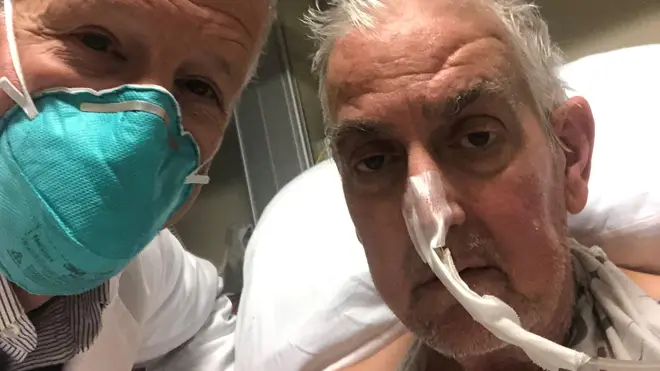
Ben Kentish 10pm - 1am
9 March 2022, 16:21 | Updated: 9 March 2022, 16:53

A man who became the first person to receive a pig's heart during a transplant has died two months after the groundbreaking operation.
The hospital that performed the surgery announced today that David Bennett, 57, died two days ago at the University of Maryland Medical Centre.
Doctors did not give an exact cause of death, saying only that his condition had begun deteriorating several days earlier.
Mr Bennett's son praised the hospital for offering the last-ditch experiment, saying the family hoped it would help further efforts to end the organ shortage.
Read more: Calls for ceasefire as Chernobyl safety systems 'at risk' after power outage
Read more: Climber dies and two taken to hospital after 17 people rescued from Ben Nevis
"We are grateful for every innovative moment, every crazy dream, every sleepless night that went into this historic effort," David Bennett Jnr said in a statement released by the University of Maryland School of Medicine.
"We hope this story can be the beginning of hope and not the end."
Mr Bennett, a handyman from Hagerstown, Maryland, was a candidate for this newest attempt only because he otherwise faced certain death.
He was ineligible for a human heart transplant, bedridden, on life support and out of other options.
After the operation to give him the genetically-modified pig heart on January 7, Mr Bennett's son said his father knew there was no guarantee it would work.
Prior attempts at such transplants - or xenotransplantation - have failed largely because patients' bodies rapidly rejected the animal organ.
The Maryland surgeons used a heart from a gene-edited pig.
Scientists had modified the animal to remove pig genes that trigger the hyper-fast rejection and add human genes to help the body accept the organ.
At first, the pig heart was functioning and the Maryland hospital issued periodic updates that Mr Bennett seemed to be slowly recovering.
Last month, the hospital released a video of him watching the Super Bowl from his hospital bed while working with his physical therapist.
Mr Bennett survived significantly longer with the gene-edited pig heart than one of the last milestones in xenotransplantation - when Baby Fae, a dying California infant, lived for 21 days with a baboon's heart in 1984.
"We are devastated by the loss of Mr Bennett. He proved to be a brave and noble patient who fought all the way to the end," Dr Bartley Griffith, who performed Mr Bennett's surgery, said in a statement.
Mr Bennett's doctors said he had heart failure and an irregular heartbeat, plus a history of not complying with medical instructions.
He was deemed ineligible for a human heart transplant, which requires strict use of immune-suppressing medicines, or the remaining alternative, an implanted heart pump.
Doctors didn't reveal the exact cause of Mr Bennett's death. Rejection, infection and other complications are risks for transplant recipients.
"We have gained invaluable insights learning that the genetically modified pig heart can function well within the human body while the immune system is adequately suppressed," said Dr Muhammad Mohiuddin, scientific director of the Maryland university's animal-to-human transplant programme.